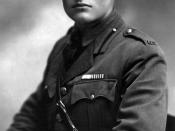War's affect on people
The main characters in "The Portable Phonograph" by Walter Van Tilburg Clark and "Soldier's Home" by Ernest Hemingway must deal with survival after war. The war changes their lifestyles and personalities. Yet Krebs in Hemingway's story and Dr. Jenkins and the musician in Clark's work have experienced different changes. The factors which influence them are not only the different affects of war, but also the role they play during the war as soldiers or civilians and their environment after the war.
Krebs goes to war when he is a college student who is always wearing exactly the same height and style collar. But ironically, after the war, he is cheated out of the chance to celebrate the glory of being a war veteran, inasmuch as he returns home months and months after the initial return of other veterans without anything new to say that the others have not already talked about.
He starts to lie, making up violent stories about the war to gain townspeople's respect and attention. Only his two young sisters are willing to listen to him. Krebs begins to resent his lies, yet without his lies he cannot communicate with people and feel respected as a soldier. Therefore he uses the only tactic that he has learned during the war, which is how to survive in a negative situation. He isolates himself from his community and finds comfort in the local pool hall where he is just another unemployed guy. He comforts his mother with lies of love and devotion. But Krebs cannot jump out of the damp shadow that war has brought upon him.
Similarly, in Clark's "The Portable Phonograph" the heartbreaking description at the beginning of the story shows how both the environment and the personalities of characters have been greatly...


